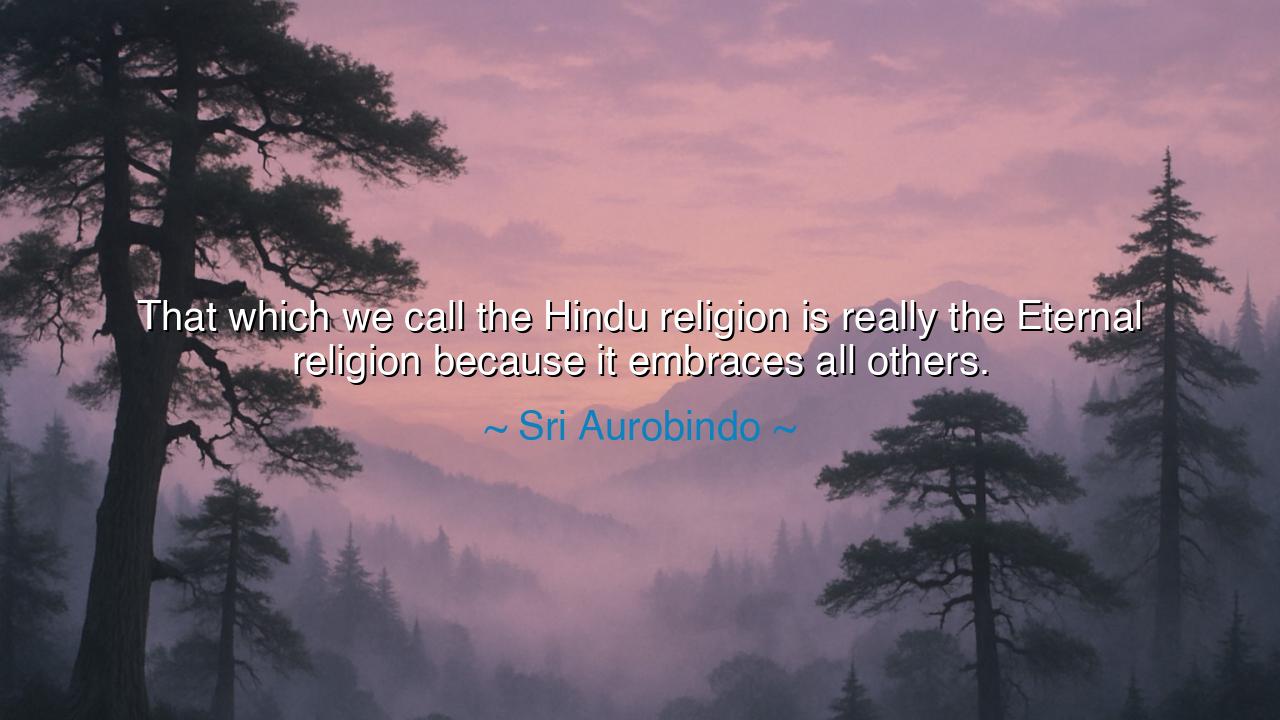
That which we call the Hindu religion is really the Eternal
That which we call the Hindu religion is really the Eternal religion because it embraces all others.






Hear, O children of the eternal spirit, the words of Sri Aurobindo, sage and visionary of India: “That which we call the Hindu religion is really the Eternal religion because it embraces all others.” In this saying lies not a narrow boast of sect or creed, but a vision vast as the sky. For by Eternal religion he does not mean one path alone, but the truth that shines through all paths. Hinduism, in its deepest essence, is not a cage but an open field, not a closed circle but a boundless horizon. It is called Sanātana Dharma—the Eternal Law—because it seeks not to exclude, but to embrace, to gather into itself the many streams of human seeking, recognizing them as flowing from one source.
The origin of this teaching lies in the very heart of India’s spiritual tradition. Hinduism has never been a single doctrine, but a tapestry of philosophies, rituals, and visions. It gave birth to yoga and Vedānta, embraced gods and goddesses in a thousand forms, yet also revered the formless and the infinite. It honored sages who taught renunciation, and also those who celebrated life. It absorbed influences from Buddhism, Jainism, Islam, and Christianity, weaving them into its cultural fabric. Thus Sri Aurobindo, seeing this vastness, named it rightly: the Eternal religion, for it reflects the eternal truth that the divine is too great to be confined in one form alone.
The ancients themselves bore witness to this spirit of universality. The Rig Veda, oldest of Hindu scriptures, proclaims: “Truth is one; the wise call it by many names.” This is no sectarian cry, but a universal anthem, declaring that all religions are but languages through which the same eternal truth is spoken. In Christianity, Islam, and Buddhism, Sri Aurobindo saw not enemies of Hinduism but brothers, each carrying a shard of the infinite jewel. To embrace them all is the true work of Sanātana Dharma.
History offers a shining example in Emperor Akbar, the Mughal ruler of India, who, though born a Muslim, sought to create a faith that embraced all religions. He called it Dīn-i Ilāhī—the “Religion of God”—a path that drew from Islam, Hinduism, Christianity, and Zoroastrianism. Though his attempt did not last, the spirit of universality he embodied reflected the same truth Aurobindo spoke of: that the divine is vast, and all religions are but approaches to the same summit.
The meaning of Aurobindo’s words is clear: religion is eternal when it unites, but mortal when it divides. A creed that insists it alone is true will wither in the long course of history, for it denies the vastness of the divine. But a faith that embraces others, that sees in every path a reflection of the eternal, endures. This is why he called Hinduism the Eternal religion—not because it is superior, but because at its heart it recognizes the universality of truth.
The lesson for us, O listeners, is profound: do not cling to narrowness. Whatever your faith, let it not blind you to the light in others. If you are Hindu, see Christ and Muhammad and the Buddha as brothers of your own saints. If you are Christian, see in the sages of India and China reflections of your own prophets. To embrace the Eternal is to see beyond names and forms, to the flame that burns alike in every temple, church, mosque, and shrine.
Practical actions stand before you: When you encounter another’s faith, do not dismiss it—listen, learn, and honor it. Study not only your own scripture but also those of others, for in doing so you widen your soul. Live as if every person you meet is a bearer of truth, however hidden. And above all, practice compassion, which is the essence of all creeds and the surest sign of the Eternal religion.
Thus, remember the teaching of Sri Aurobindo: “That which we call the Hindu religion is really the Eternal religion because it embraces all others.” Hold this not as a claim of superiority, but as a call to universality. For only when we embrace the many as one will we touch the Eternal; and only when we honor every path will we walk firmly upon our own.






AAdministratorAdministrator
Welcome, honored guests. Please leave a comment, we will respond soon